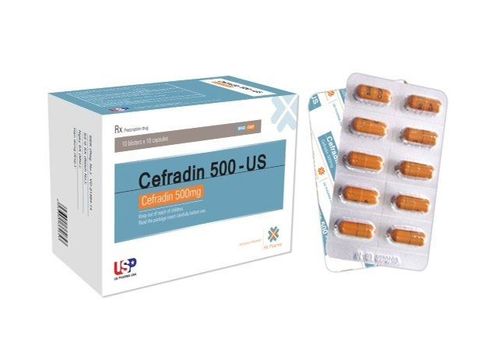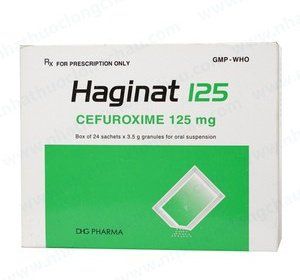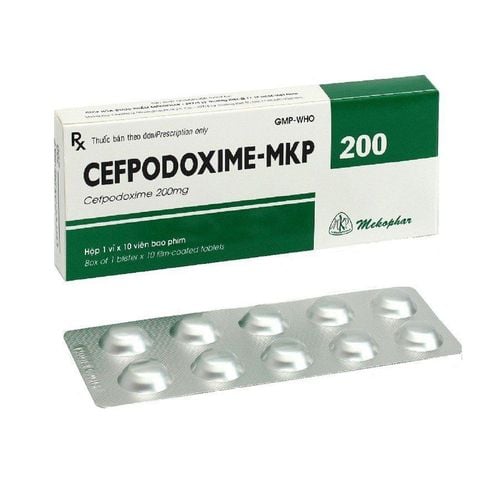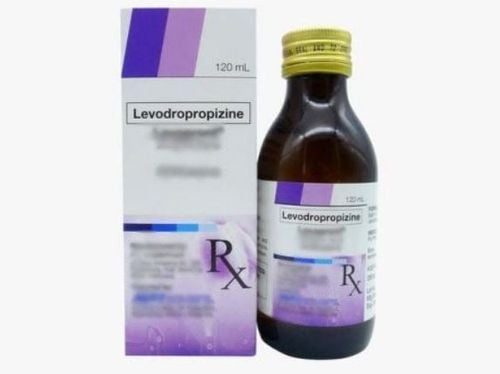This is an automatically translated article.
Metiny medicine contains the main ingredient of Cefaclor antibiotic and other excipients in sufficient quantities. This is an oral antibiotic, effective in the treatment of acute bronchitis, pharyngitis, tonsillitis, sinusitis, urinary tract infections,...
1. What is Metiny?
Metiny medicine contains the main ingredient is the antibiotic Cefaclor (as Cefaclor monohydrate) 375mg. The main active ingredient is an oral antibiotic, a 2nd generation cephalosporin group.
The drug has anti-parasitic, anti-infective, antiviral and antifungal effects. The brand name Metiny is available as a slow release film coated tablet. Packing is a box of 1 blister, each blister contains 10 tablets.
Metiny brand name drug is a modified release preparation containing cefaclor – a semisynthetic cephalosporin antibiotic for oral use. Metiny film-coated tablets are blue, caplet-shaped with both convex sides.
2. What disease does Metiny treat?
Metiny brand-name drug is a slow-release tablet indicated in the treatment of infections caused by susceptible strains of bacteria:
Acute bronchitis and acute exacerbation of chronic bronchitis caused by Haemophilus influenzae (strains only) do not secrete beta-lactamase), Moraxella catarrhalis bacteria (including beta-lactamase producing strains) or Streptococcus pneumonia, Streptococcus aureus. Pharyngitis and tonsillitis caused by Streptococcus pyogenes (group A streptococcus). Pneumonia caused by Streptococcus pneumoniae, Haemophilus influenzae (only strains that do not secrete beta-lactamase), Moraxella catarrhalis (including beta-lactamase-producing strains). Sinusitis caused by Streptococcus pneumonia (only strains sensitive to penicillin), Haemophilus influenzae (only strains that do not secrete beta-lactamase), Moraxella catarrhalis (including strains secreting beta-lactamase). Uncomplicated lower urinary tract infections, including cystitis caused by bacteria such as Escherichia coli, Proteus mirabilis, Klebsiella pneumoniae, Proteus mirabilis, and Staphylococcus saprophyticus. Skin and skin structure infections caused by Staphylococcus aureus (methicillin sensitive).
3. Usage and dosage of Metiny
3.1. Dosage: Absorption of Metiny extended-release tablets is enhanced when taken with food. Therefore, Metiny should be taken with food (i.e. within 1 hour of eating). You absolutely must not cut, crush or chew the tablet while taking it.
3.2. Dosage of the drug: Treatment of bronchitis: dose 375 mg each time, 2 times a day. Treatment of pharyngitis, tonsillitis, skin and skin structure infections: dose 375 mg each time, 2 times a day. Treatment of pneumonia, sinusitis: dose 750mg each time, 2 times a day. Treatment of lower urinary tract infections: dose 375 mg each time, 2 times a day. In the treatment of infections caused by group A streptococcus, it is recommended to use the brand-name drug Metiny for at least 10 days.
4. Case of overdose of Metiny
Signs and symptoms: Symptoms of poisoning after an overdose of drugs containing the active ingredient Cefaclor may include nausea, vomiting, epigastric pain, diarrhea. The degree of epigastric pain and the degree of diarrhea depend on the dose of drug used. If additional symptoms are present, it may be a secondary reaction to an underlying disease, an allergy, or the effect of other concomitant poisonings.
Treatment: When treating an overdose of Metiny, it is necessary to consider the possibility of multiple drug overdoses, drug interactions, and abnormal pharmacokinetics of the patient. Doctors usually prescribe:
Respiratory protection, respiratory support and fluids. Carefully monitor vital signs: pulse, temperature, blood pressure, breathing rate; gases in the blood; serum electrolytes... Reduce gastrointestinal absorption of drugs by using activated charcoal, which in many cases is more effective than intestinal lavage or vomiting. The physician may prescribe the use of diuretics, peritoneal dialysis, hemodialysis or activated charcoal column adsorbent hemodialysis proved ineffective in the management of an overdose of cefaclor.
5. Undesirable effects of the drug Metiny
Common undesirable effects when taking the drug, including:
Blood: Eosinophilia. For the digestive system: Diarrhea Skin effects: Measles-like skin rash. Uncommon side effects when taking the drug, including:
Systemic: Positive direct Coombs test Blood: Increased lymphocytes, neutropenia, leukopenia. For the digestive system: Nausea, vomiting a lot. Skin effects: Urticaria, urticaria Urinary and genitourinary system: Genital itching, vaginitis, candidiasis Rare adverse effects when taking the drug, including:
Systemic: Anaphylaxis, fever, serum sickness-like symptoms, Stevens-Johnson syndrome, toxic epidermal necrolysis (Lyell's syndrome), systemic purulent rash Serum sickness-like reactions are common in children Children than adults: Mild erythema multiforme, skin rash, arthritis or joint pain, fever and possibly with lymphadenopathy and proteinuria Blood: Hemolytic anemia, thrombocytopenia For the digestive system : Pseudomembranous colitis For liver: Increase in liver enzymes (AST, ALP, alkaline phosphatase), hepatitis and cholestatic jaundice For kidney: Reversible interstitial nephritis, increase in blood urea or serum creatinine, test Urine abnormalities CNS: Seizures (with high doses and impaired renal function), agitation, headache, nervousness, insomnia, confusion, increased muscle tone, dizziness, hallucinationsand somnolence Other parts: Joint pain You need to actively inform your doctor about any unwanted effects that you or your loved ones experience when using the drug.
6. Interactions of Metiny
The extent of absorption of Metiny slow-release tablets is reduced if antacids containing aluminum hydroxide or magnesium hydroxide are taken within 1 hour of taking the drug.
H2 blockers do not affect the rate and extent of absorption of the brand name Metiny drug .
Drugs that lower blood uric acid (probenecid) inhibit the renal elimination of cefaclor. There have been rare reports of an increase in prothrombin time, with or without bleeding, in concomitant use of cefaclor and warfarin.
7. Some notes when treating with Metiny
7.1. Contraindications of the drug: People with a history of hypersensitivity to the active ingredient Cefaclor, other cephalosporin antibiotics or any of its ingredients.
7.2. Use with caution: Superinfection (overgrowth of non-susceptible organisms) is likely to occur during treatment with broad-spectrum antibiotics such as the active ingredient cefaclor. People who are being treated with Metiny slow release drug may lead to false positive urine glucose test. Before starting treatment with Metiny, a brand-name delayed-release drug, it is necessary to determine if the patient has a history of allergy to cefaclor, cephalosporins, penicillins or any of its components. If you are allergic to Metiny, you need to stop taking it immediately. Metiny should be used with caution in people with a history of gastrointestinal disease, especially colitis. Pseudomembranous colitis occurs in most cases of broad-spectrum antibiotics, including the active ingredient cefaclor. Therefore, it is important to consider the diagnosis of people with diarrhea while taking antibiotics. In case users experience undesirable effects such as mild pseudomembranous colitis, just stop treatment with the drug. Safety and efficacy in children under 16 years of age have not been established. People with rare hereditary problems of galactose intolerance, the Lapp lactase deficiency or glucose-galactose malabsorption should not take this medicine. Effects on Drivers and Machines: Effects of Metiny on the ability to drive and use machines: Metiny extended-release tablets have not been studied for use while driving. vehicles and operating machinery. The use of drugs while driving or operating machinery is given only if necessary. In short, Metiny is a prescription drug, the product is only used when prescribed by a qualified doctor. By using the right dose, the goal will bring better treatment results.
Please dial HOTLINE for more information or register for an appointment HERE. Download MyVinmec app to make appointments faster and to manage your bookings easily.













